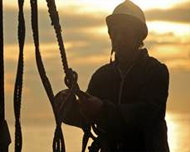
An almost entirely green preliminary scoring card has been presented on the PNA skipjack and yellowfin tuna fishery, which is currently undergoing the standard five year MSC certification reassessment, as the third party assessor offers its draft report, opening the floor to stakeholder comments. The big question is; how will stakeholders react following a recent round table discussion in London, focused partly on the PNA certifications’ Chain of Custody?
Across three main principles, split into 28 separate criteria, Acoura Marine, the third party Certification Assessment Body (CAB) responsible for the PNA checkup has given the tuna fishery some of the highest possible scores on nearly every point of this preliminary assessment. A score of 80 or more means a pass with no condition, and the fishery scores 100 in seven separate areas, 90 or above in 10 more, and between 80 and 90 in a few others.
There are three criteria in which the PNA fishery scores below 80 points, and while still a pass, it means that conditions of improvement will be set in regards to these areas, if the scores remain the same. These three points cover harvest strategies for both skipjack and yellowfin, HCRs in regards to both species, and management of Endangered, Threatened or Protected (ETP) species.
So far, the pushing through of HCRs in the Western Pacific as a whole has been largely left to consensus and establishment in WCPFC meetings. However, due to slow progress within the RFMO, the PNA has shown keenness to establish its own measures in the waters covered by its eight Pacific island nation members.
By its fourth annual surveillance audit, should the fishery gain recertification, it will need to demonstrate that for both skipjack and yellowfin, Harvest Strategies are in place that are responsive to the state of the stock and will work to achieve certain stock management objectives. Well defined HCRs that are expected to keep the stock fluctuating around a target level are also required for retaining the MSC certification for the fishery.
In terms of ETP species, the condition set requires that by the fourth surveillance audit, the client would need to demonstrate there is a strategy in place that is expected to ensure that the recovery of manta rays and devil rays is not hindered by the certification of the fishery. The PNA has said that this aspect of the assessment is something new that has come up and it supports looking into this, if there is a species of concern.
In response to the draft report as a whole, PNA told Atuna that clearly the fishery is again well scored, reflecting its robust management.
There has been a string of criticism targeted at the PNA fishery in recent months, in which the certification of only free-school fishing, for vessels that also use FAD sets, has been concerning certain parties. This gives indication that numerous stakeholder comments could be submitted in relation to the PNA fishery’s reassessment. A 30 day period of consultation is now open for any stakeholders that wish to submit a reaction to the report; comments which can possibly have impact on the scoring in the final CAB report.